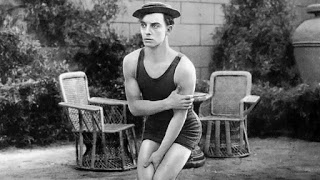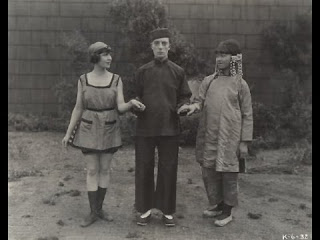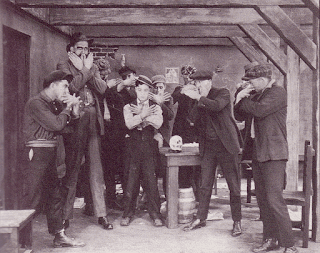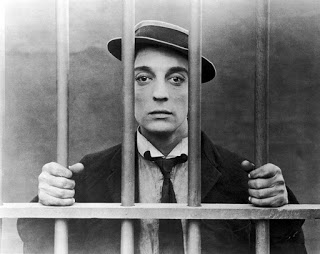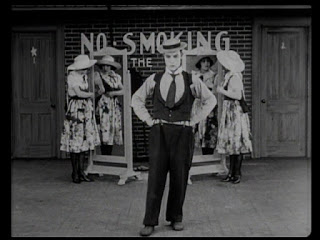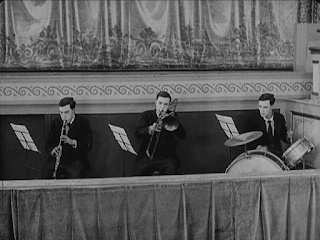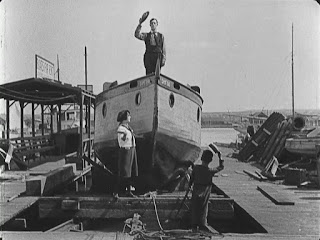Buster Keaton Shorts - 1921
The Haunted House
(1921) – 5/10
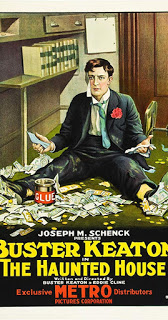
Not one of the better Buster Keaton shorts. It is basically a series of gags
that in the end don't amount to much. The first half of the 21 minutes is
taken up with Buster as a bank teller getting glue on his hands, the money,
customers and pretty much everything else. In the second half it gets weirder
with Buster hiding in what is thought to be a haunted house but is actually
being used by counterfeiters (Joe Roberts). They are using various ploys
to make it seem haunted such as a staircase that turns into a slide and ghosts
walking about with sheets. It gets more outlandish as it proceeds at rapid
speed but it was more strange than funny to me. The girl is Virginia Fox
who was to appear in a bunch of Keaton films. She was married to Darryl Zanuck
who ran 20th Century Fox for decades from 1924 to his death in 1979.
Hard Luck (1921)
– 5/10
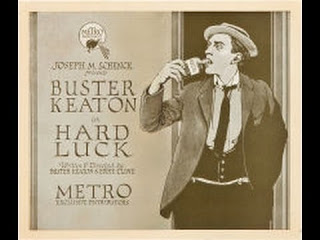
A bit of a mishmash from Buster this time out with a few smiles but no real
laughs. Though apparently the ending of the film according to Buster got
the biggest laugh in his career - but that tiny bit has been lost though
it is explained. The film is just all over the place as if Buster had a few
leftover gags and just decided to throw them all into this film with no real
coherence. At first he is down on his luck and tries to kill himself in various
ways - unsuccessfully - then he gets hired to capture an armadillo - that
goes nowhere - next he joins a foxhunt - then he breaks up a robbery by Joe
Roberts and saves the damsel (Virginia Fox) from rape and then the last gag.
In this gag Buster climbs the high dive board and lands outside of
the pool and creates a hole so deep no one can see him. Years later he returns
with a Chinese wife and two children. I guess you had to see it!
The High Sign
(1921) – 6/10
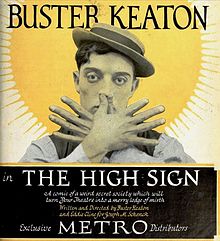
After Buster Keaton and Fatty Arbuckle went their separate ways, Keaton continued
working under the financial umbrella of Joseph Schenck who later on became
one of the real characters in Hollywood and became the Chairman of 20th Century
Fox. Schenck also married Norma Talmadge who was a big silent star. Buster
later married her sister and was miserable ever after. His brother Nicholas
Schenck was one of the big boys at MGM later on and was disliked intensely
throughout the industry. But not Joseph who was well loved and a philanderer
and gambler at the top level.
The High Sign was the first film that Keaton made on his own but after finishing
it decided that it wasn't good enough to be his first release so he set it
aside for a year and it became his 9th release. The honor of being his first
film went to One Week which up to High Sign is about the best comedy short
I have seen. But this one isn't bad - just not as perfect as One Week. It
has a few gags along the way but ends with a great beautifully performed
sequence of acrobatic stunts.
Keaton gets a job in a shooting gallery by pretending to be a great shot
that involves a dog, a rope and a bell. So good a shot in fact that his boss
(the giant Joe Roberts) inducts him into a gang of hired killers called the
Blinking Buzzards and gives him his first target. At the same time he is
hired by a gentleman and his lovely daughter to be his bodyguard. It is of
course the same man and obviously the cute girl wins out. For safety sake
the gentleman has had a series on trap doors and hidden rooms built into
his house and when the gang shows up Keaton utilizes them brilliantly flying
through windows, mirrors, secret doors, climbing up trellises to battle them.
It is very clever. Keaton loved gadgets and was very hands on and they show
up in many of his films.
The Goat (1921)
– 8/10
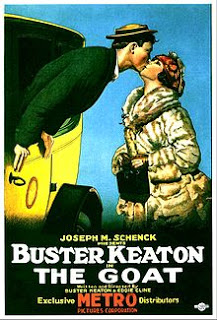
I am back to my attempt to see all of Keaton's silent films in chronological
order. Slowly but surely. I don't want to go too quickly because some of
these you just want to savor. They are like expensive chocolates. This is
one of those. Since Keaton went off on his own after his partnership with
Fatty Arbuckle in 1920 Keaton had made three shorts that are brilliant -
One Week, Neighbors and this film. There were others that have some great
bits but not sustainably masterful as those three are.
The Goat is basically one long chase - as so many of those silent comedies
were especially from producer Hall Roach - but the gags are so clever and
yet so understated that they whiz by you like a fastball up and in. It is
just one after another going by so quickly that you can barely take one in
before there is another. But they all neatly fit into the narrative and his
character and never feel like they were done just because it seemed like
a good idea.
They build up slowly with Buster standing in line for bread only to realize
that he is standing behind two mannequins - to accidentally hitting a cop
with a lucky horse shoe and the chase is on with one cop, then two cops and
three cops joining in. He then gets mistaken for an escaped killer with people
running when they see him until he finally uses the newspaper picture of
him to good advantage to scare away a driver and get the girl (Virginia Fox).
There are some brilliant gags with elevators or a phone booth that Buster
pretends is an elevator - but the best physical gag is something Jackie Chan
should have borrowed. Trapped in a room by the large Joe Roberts, Keaton
in one perfect motion jumps on a chair onto to Robert's shoulders and head
first out the transom window. You just have to go wow. How many takes did
that take I wonder?
The Play House
(1921) 8.5
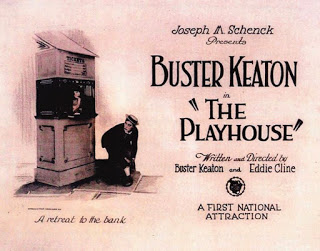
Buster goes up to the ticket window to purchase a ticket to an opera and
pulls out his accordion wallet to find a quarter. He then goes into the theater
where he (Keaton) is playing every instrument simultaneously and conducting.
So we have seven Buster Keatons on the screen at the same time – no wait
– also Keaton pulling up the stage curtain where more Keaton’s are dancing
and telling jokes. “The wind was so hard that it blew a silver dollar into
four quarters”. And Buster in blackface. And Buster as both husband and wife
in the audience. You get the idea.
This is a tribute to his many years in vaudeville with his parents where
he at one time or another did everything. It is also about illusion from
Keaton appearing in multiplicity on the screen to a set of twins confusing
him, mirrors scaring him and when a monkey escapes he has to pretend to be
the monkey on the stage. Then there is of course the mandatory chase with
giant Joe Roberts and an exploding water tank that washes the audience out
the door. For 1921 this is rather an amazing film technically getting multiple
Keaton’s on the screen in perfect harmony and there are plenty of laughs.
Up there with his best films so far.
The Boat (1921)
– 6.0
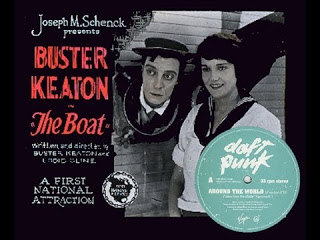
In a theme that Keaton was to repeat a few times, mother nature has it in
for Buster Keaton. Here Keaton brings back actress Sybil Seely who had been
in his first three shorts - One Week, Convict 13, The Scarecrow - because
he envisioned The Boat as a continuation of One Week. Seely had been a former
Mack Sennett bathing girl and was a favorite of Keaton fans (myself included).
Women admittedly don't get to do a lot in most Keaton films other than be
a love interest, but Seely stuck out with her dark Italian eyes. In One Week,
she and Buster are married and in a near perfect short Keaton tries to build
a house for her and no matter what catastrophes ensue she calmly stands or
sits by the man she loves.
In The Boat Keaton is now married with two boys and has built a boat in the
basement of his house. Clearly, not the house in One Week! Of course, immediately
all begins to go wrong as Keaton has not left enough room to get the boat
out of the house and he brings the house down trying and once at the dock
in an attempt to launch the boat he sinks his car. But eventually, he piles
the wife and the two boys (in their pork-pie hats) into the boat and sets
sail. But again catastrophe strikes in the form of a storm and total incompetence.
A lot happens in the 23 minute running time but it feels a bit predictable
at times and doesn't rate as highly with me as many other Keaton fans.
Keaton had married in 1921 - between The Goat and The Play House - to Natalie
Talmadge. She was the sister of Norma and Constance Talmadge, both very successful
actresses. Norma was also married to Joseph Schenck, who had financed all
of Keaton's films. It was to turn into a very unhappy marriage as Natalie
spent enormous amounts of Buster's finances and made his life miserable.
This was to have a very bad effect on Keaton over time.
